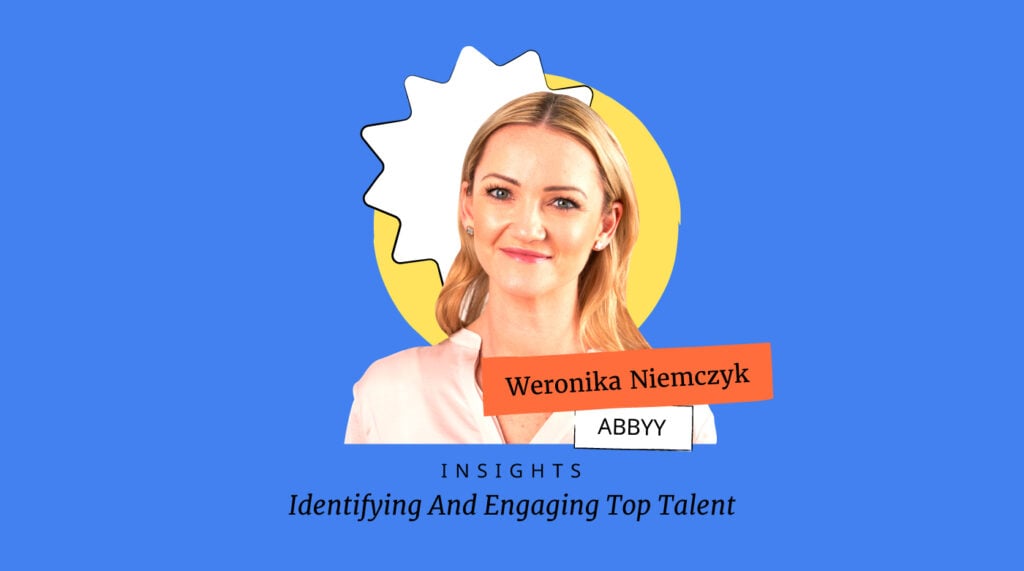Companies are always on the lookout for talented people. In this interview series, we talk to seasoned HR professionals to pick their brains for ideas and insights on finding the right talent for our organizations.
Hi Weronika, welcome to the series! Before diving in, our readers would love to get to know you. Can you tell us the "backstory" about what brought you to this specific career path?
I didn’t always know I would develop my career in HR, but I did always have an interest in people and the human condition in general. I have a master's in psychology and, towards the end of my studies, I went on to do a few internships in HR. That solidified my career path and general interest in humans in a business context.
A few years later, I did an MBA as I felt I needed to expand my business acumen and I found my sweet spot, which is enabling personal development in the context of business and organizations. Since then, I have been doing exactly that—supporting individuals and groups in their pursuit of achieving business goals, as they grow personally, and as professionals and leaders.
Throughout my career, I’ve developed a real passion for talent development, culture, diversity and inclusion, and anything personal growth related.
I love what I do. My job enables me to meet and work with some truly exceptional people; I always learn something new.
One of the benefits of working in the HR space is the variety that it offers. You can move between industries and areas of expertise, there is no limit as to what you can experience and learn.
I feel very grateful for where my career path took me.
It's said that our mistakes can be our greatest teachers. Can you share a story about the funniest mistake you made when you first started? Then, can you tell us what lesson you learned from that?
This would have to be when I first started my career. I joined a local HR team that was going through a lot of change and leadership transition. It was not the easiest environment to navigate, especially after our manager left the business and we were asked to manage ourselves and work (almost like in a self-managed team) until a replacement was identified.
We all assumed there was an external search taking place and just got on with our jobs. It was certainly a-typical, and we all figured out how to plan and stay aligned as one team. We had our moments of doubt, though, and often joked that whoever would come to run the team wouldn’t have an easy task with us being so used to just doing it all ourselves.
Little did I know that I would be asked to step into this leadership position a few months later. I ended up accepting the offer. There are two things I have learned from this: firstly, whether you’re formally “the boss” or not, nothing has to change in the way you work with people—the same rules apply.
You’re still the same person and, in 99.9% of situations, you just need to be open to working with people as a peer vs a show of authority—this approach always yields better results and generally makes work much more productive and fulfilling.
Secondly, you may be presented with opportunities you have not seen coming or perhaps you would prefer to explore at a different time. Regardless of the circumstances, if you think you might learn something new, just go for it.
We are all figuring it out as we go, and that’s what makes work interesting.
Can you please give us your favorite "Life Lesson Quote" and how that was relevant to you in your life?
Someone I had the pleasure of working with in the past told me that his great life lesson is to judge less and that the world would be a much better place if we all judged less and loved more.
I could not agree more, and it applies throughout all dimensions of life, both personally and professionally.
There’s a quote I attribute to Mother Teresa (though I am not sure it is hers) that goes something like “Be careful not to judge them, as you lose the capacity to love them.” Particularly in today’s world, with so many polarized views on all things related to humanity and society, openness and less judgement is possibly the only way we can find common ground.
When we judge, we shut down, narrow our perception, and limit ourselves to our ability to see others via our own experience. And, let’s be honest, we won’t all be able to have the same experience as some of it is tied to our ethnicity, gender, belief system, religious beliefs, etc.
Regularly, I am being reminded in my life to judge less. There’s a different interpretation—if we offer this to others, we should also experience it ourselves, and, who knows, perhaps the world will be a better place!
Are you working on any exciting new projects at your company? How is this helping people?
2023 promises to be a busy and exciting year for me and my People Team at ABBYY. Some of the keywords defining our priorities for next year are: improving employee experience, boosting performance, and developing great managers.
After a year in which we have undergone a series of organizational changes, in the coming months we are revisiting many elements of our ABBYY culture and working on creating an environment where our global, diverse workforce can really thrive.
It is widely known that a positive company culture can foster a sense of community and belonging among employees, which can lead to a more enjoyable and satisfying work experience.
Fortunately, we have a solid foundation to build on, with our global team reporting above-industry-average scores month after month in 2022. For example, we scored over 9 out of 10 for flexible working and the same for employee autonomy.
But we know there is always room for improvement, and one area we are looking at is our managers’ capabilities and management practices across the company. We aim to elevate this coming year so that, in turn, our leaders can provide an excellent experience to every member of our team.
Wonderful. Now let's jump into the main focus of our series. Hiring can be very time-consuming and challenging. Can you share with our readers a bit about your experience with identifying and hiring talent? What's been your most successful recruitment-related initiative so far?
At ABBYY, we hire some of the industry’s brightest individuals. And our approach can be summed up quite simply as: we find the best people and we make sure we offer them exactly what they need in order to thrive.
Our hiring approach is a rather targeted one, and we are fortunate to have a brilliant team of recruiters who are doing a splendid job identifying those candidates who would really make a good fit, not just for the role, but for the ABBYY team and culture.
While we have an attractive global EVP (employee value proposition), we are also ready to customize our offering to fit the different needs and wants of specific groups in the talent market. At the end of the day, we want to ensure that folks who join the team are supported and empowered to do their best work, which ultimately helps move ABBYY forward.
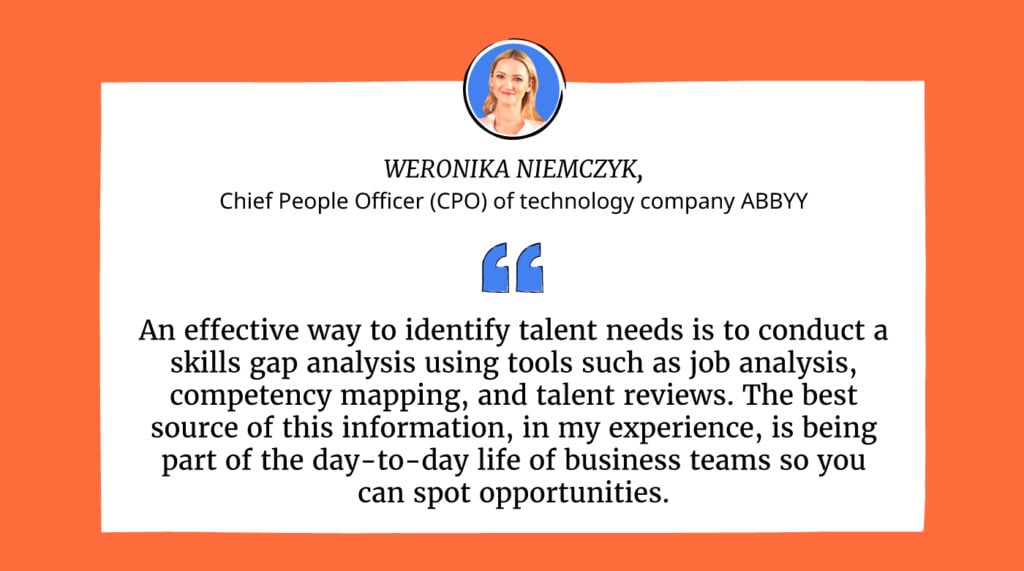
Once talent is engaged, what's your advice for creating a great candidate experience and ensuring the right people go through the process?
When it comes to making our recruitment process as smooth and efficient as possible, we know both our recruiters and hiring managers are the ones who help candidates get a first glimpse of what life at ABBYY looks like.
As such, we make it a priority to provide an excellent candidate experience by:
- Communicating clearly and promptly: responding to candidates in a timely manner and keeping them informed about the status of their applications.
- Making the application process smooth: streamlining the application process to only include the most essential steps that help us assess the candidate and allow the candidate to assess ABBYY as a company and their future team.
- Showing appreciation: often overlooked, simply thanking candidates for their interest and time put into the recruitment process can make the difference between a good and not-so-good candidate experience, regardless of the outcome.
- Providing feedback: if a candidate is not selected for the role, providing feedback on their application is paramount to help them improve. Sometimes, they come back a few months later better prepared and ready to join our team!
- Creating a positive and welcoming environment: ensuring that candidates feel welcome and respected throughout the hiring process.
- Offering support: providing resources or support to help candidates prepare for interviews or practical challenges. Our team wants candidates to succeed, and so we often give them the tools and insights needed to showcase their skills and competencies.
- Being transparent: being honest and transparent about the hiring process and the expectations for the role is key to not only hiring the right folks, it's also ensuring they stay and thrive in the company.
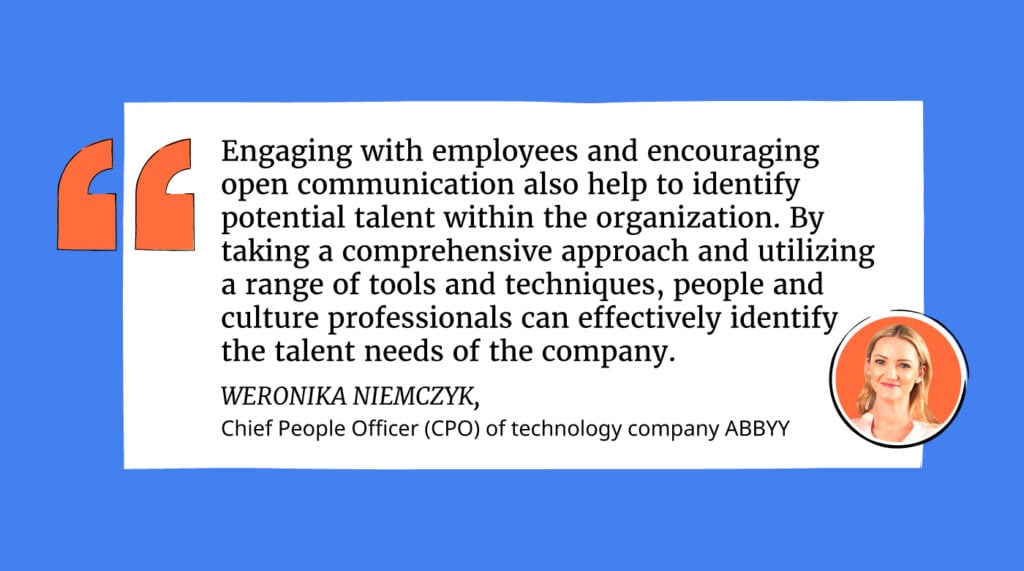
Based on your experience, how can HR and culture professionals work with the broader organization to identify talent needs?
I am not a fan of the word “HR” so allow me to use “People” instead. People and culture professionals must make it a priority to collaborate with managers and teams to understand their current and future staffing needs, as well as the skills and expertise required to meet those needs.
An effective way to identify talent needs is to conduct a skills gap analysis using tools such as job analysis, competency mapping, and talent reviews. The best source of this information, in my experience, is being part of the day-to-day life of business teams so you can spot opportunities.
It is also crucial to be in lockstep with the commercial side of the organization—to observe and anticipate challenges and propose solutions. The People team should be part of every business decision as inevitably all of those decisions have a people component to them.
Engaging with employees and encouraging open communication also helps to identify potential talent within the organization.
By taking a comprehensive approach and utilizing a range of tools and techniques, people and culture professionals can effectively identify the talent needs of a company.
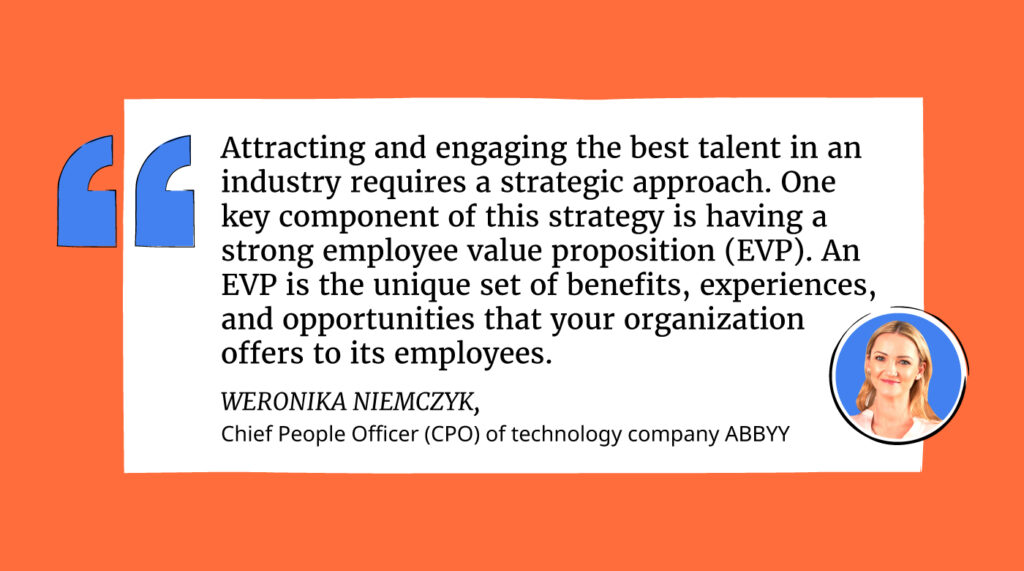
Is there anything you see that recruiters, internal or otherwise, do regularly that makes you think, "No, stop doing that!"?
Going with a one-size fits all approach. It simply does not work anymore, especially post-pandemic with more people working remotely or hybrid. People have greater expectations to be treated in an individual manner, and rightly so, or you end up alienating the needs of a diverse team.
Every candidate is unique, with their own set of skills, experiences, and preferences, and a one-size fits all approach fails to take these individual differences into account.
As a result, it may not effectively identify the best fit for a particular role. Listing a role for three days a week in the office and two at home, for example, will work for some but not others.
Certain skills are in high demand, and people are looking to negotiate working on their own terms, so companies that are rigid will lose out to organizations with a more flexible approach.
In the long run, using a one-size-fits-all approach may lead to a high turnover rate, as candidates may not feel supported in their roles if their needs are not being met.
It is clear that a more personalized approach to recruitment is necessary in order to attract and retain top talent.
Ultimately, though, I can also see many companies really invest in the candidate experience. I’ve met some wonderful recruiters who went out of their way to make the candidate feel valued and appreciated. At times, that means that companies need to just get out of their way with too many processes, so they can do their best and look after the future talent.
With so much noise and competition out there, what are your top 3 ways to attract and engage the best talent in an industry when they haven't already reached out to you?
Attracting and engaging the best talent in an industry requires a strategic approach.
One key component of this strategy is having a strong employer value proposition (EVP).
An EVP is the unique set of benefits, experiences, and opportunities that your organization offers to its employees.
Once you have a strong EVP that puts you ahead of your competitors in the job market, it’s time to bring it in front of your desired audience:
- Use targeted job postings and actively reach out to potential candidates: advertise open positions on job boards and social media platforms and be sure to include details about your company culture and the benefits of working for your organization.
- Encourage employee referrals: Your current employees likely have a network of colleagues and contacts who would be a good fit for your organization. Encourage them to refer these individuals for open positions and be sure to emphasize your EVP as a selling point.
- Utilize social media and professional networking events: leverage social media platforms and networking to connect with potential candidates and showcase your EVP. This can help you reach a wider pool of talent and differentiate your company as a great place to work.
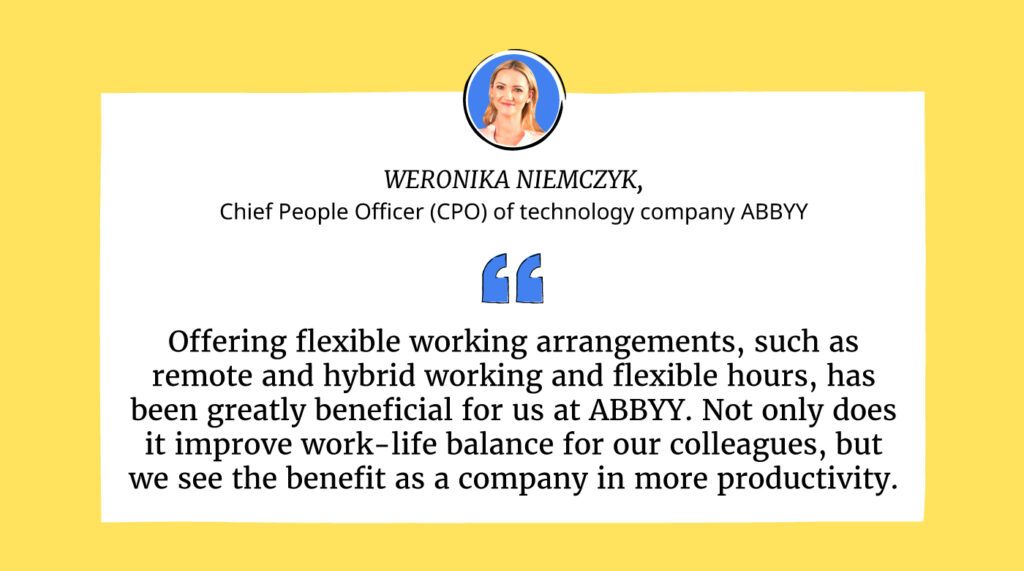
What are the three most effective strategies you use to retain employees?
1. Offering competitive compensation and benefits packages and introducing flexible work policies
Let's be real, everyone loves a good paycheque and a comprehensive benefits package. Plus, it'll make it harder for your competitors to poach your top talent.
Flexibility at work is becoming a norm. It’s less about how you work and more about how your work helps the company move forward.
Offering flexible working arrangements, such as remote and hybrid working and flexible hours, has been greatly beneficial to us at ABBYY.
Not only does it improve work-life balance for our colleagues, but we see the benefit as a company in more productivity.
2. Foster a positive work culture
Creating a place where employees feel valued and supported is key. No one wants to work in an environment that does not bring out the best in them.
3. Provide opportunities for growth and development
Your employees will get bored if they feel like they're stuck in a dead-end job. Offering ongoing training and development opportunities to keep colleagues engaged and motivated is another way to make sure that employees see the benefit of sticking with you for the long run.
At ABBYY, we provide free LinkedIn Learning courses which have proved extremely successful, with a 70% take-up rate and more than 2,000 hours of study completed. Courses include everything from JavaScript Essential Training to Learning Kubernetes to Speaking Confidently and Effectively to Goal Setting.
Also, we have seen several of our colleagues switch jobs within the company and take a whole new career path.
Here is the main question of our interview. Can you share five techniques that you use to identify the talent that would be best suited for the job you want to fill? Please share an example for each idea.
Although these points might seem obvious, it's important to remember that recruitment is not rocket science. Often we overlook the simple things in our pursuit of the perfect candidate. That being said, here are several techniques that can be used to identify the best-suited talent for a role:
1. Networking
Having your team connect with industry professionals and building relationships with potential candidates can help to identify top talent.
A good example is industry-specific events which often concentrate pools of highly qualified talent and can be leveraged for recruitment purposes by recruiters and hiring managers alike. For example, at ABBYY, we sponsored the JSConf Budapest – an international conference bringing together JavaScript enthusiasts from all over the world. It’s a magnet for software developers and a great place to find talent.
2. Competency mapping
This involves identifying the specific competencies or capabilities that are required for particular roles and within particular teams. For example, a technical team leader will need to ensure the productivity of his line reports, so having accountability for other people’s results will be a skill they will need to demonstrate e.g. knowing how to set goals, give guidance and be a good coach.
3. Skills assessment
Skills assessments are tests or exercises that are used to measure a candidate's knowledge, skills, or abilities in a particular area. While not mandatory for all roles, many of our candidates undergo some form of skills assessment during the recruitment process in order to showcase their relevant capabilities. These tests may include carrying out a technical task or analyzing soft skills through some sort of psychometric platform.
4. Well-designed interviews
Conducting in-depth interviews with candidates can help to identify their strengths, skills, and experiences and determine if they are a good fit for the role.
For example, at ABBYY our hiring process has changed so that more people are involved in the hiring process. The hiring managers no longer make the decision. Instead, we have created a hiring ‘group’.
As a candidate, you meet with different managers—one will interview you on technical skills, another on soft skills, maybe another on leadership skills or work style, and whether you’re a good culture fit.
As a hiring manager, you need more than just data points from a 60-minute interview to get a good impression of someone’s ability and personality for the role. Now the decision and responsibility of taking on a new hire is spread between the group at ABBYY.
5. Encouraging employee referrals
Employee referrals are a great way to attract talent because employees are likely to refer candidates who they think will be a good fit for the company based on their experience and perception of working there.
Employees know your company's culture and values, and they are likely to recommend people who align with those values.
In addition, employee referrals can be a good source of talent because they often have strong relationships with the people they refer. This can make the hiring process more efficient, as the employee can provide insight into the candidate's qualifications and work style.
Is there a person in the world whom you would love to have a private lunch with and why?
There are many brilliant minds and hearts that I would love to meet with, however my top choice would be Brene Brown. I wouldn’t make the lunch private though, I would love to share her wisdom with a group of my colleagues!
I've read Brene’s books, I listen to her podcasts, and I am inspired by the conversations she has with some truly remarkable people. There are some difficult topics she is tackling with a lot of grace, openness, and bravery—so important today. I would be absolutely delighted to meet her and hopefully maybe one day I will.
Thank you some much for your insights Weronika! How can our readers continue to follow your work online?
You can follow ABBYY on these platforms to stay up to date on company news, product updates, and other information.
And if you’d like to connect with me, you can follow me on LinkedIn.
Related read: Revolutionizing Your Talent Development With Skills Mapping

